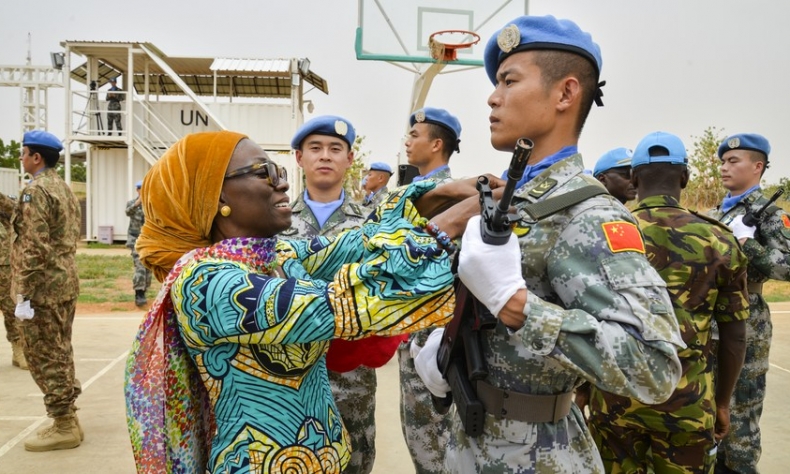Global Security Initiative: One More Step for a Long Road

This philosophy seeks to create a framework of international relations in which all nations work together for the general welfare, setting aside antagonisms and enmities of the past.
The global initiatives that are born from China for humanity with a shared destiny, require that states have the capacity to interpret a diverse and complex set of present and future possibilities in a context of various uncertainties, and if in these frameworks they can identify the problems and opportunities of the present and the future with diplomatic policies and actions based on multilevel governance models, with criteria of legitimacy, equality, responsibility, effectiveness and efficiency.
To understand China in the new era is to appreciate how, in the past twelve years, the international community has witnessed constant efforts at innovation and change. This understanding requires leaving aside the Western visions and opening to being permeated by a millenary trajectory of intellectual currents. This is the essence of understanding China as a center and method in the construction of global governance based on egalitarian and orderly multilateralism.
The Chinese tradition is based on a process of continuous transformation — an ever-present historical dialectic — in which the core of culture is values. Therefore the process of cultural transformation is inevitable and necessary, which in turn requires a clear distinction between cultural trust and cultural identity.
The Global Security Initiative (GSI) is part of China’s complex and systemic effort to improve global governance capabilities through the exercise of egalitarian multilateralism in which all states are responsible for building a global voice and orderly multilateralism, within the framework of a system of rules and principles based on the Charter of the United Nations.
The GSI includes a neighborhood policy based on the notion that “a close neighbor is better than a distant brother”. The development, stability and progress of neighboring countries are essential to ensure one’s own progress, stability and development. In this way, the GSI is an additional path to seek a safer and more cooperative world, overcoming the dichotomous friend/enemy vision of the Cold War in the last century.
When all the roads end, the real journey begins. This is perhaps one of the lessons that humanity can draw from China’s majestic efforts in building this global governance. When the deterioration of Western principles and values becomes noticeable, China turns its eyes to a thousand-year-old history, where there is a continuous influx of inspiring ideas that respond to present and future challenges.
The GSI is a open path at every step, seeking a safer and more cooperative world, promoting mutual respect and the shared search for solutions among nations.

The Global Security Initiative seeks the commitment of all nations to collaborate in the fight against terrorism, transnational organized crime, the proliferation of weapons of mass destruction, and other security problems such as cybersecurity in the digital age. It serves as a meeting place for addressing present and future challenges.
Each country has its own way of addressing its internal security problems, which is respected. For that reason, the initiative doesn’t seek to impose a single security strategy or model, but rather to recognize and learn from the different perspectives and experiences of nations, considering the development of common global strategies to face the security problems of the twenty-first century as a community that shares the same destiny.
By fostering cooperation and mutual understanding through a perspective of egalitarian and orderly multilateralism, the GSI will be able to move towards a more inclusive and oriented approach to building world peace and stability. This promotes the peaceful resolution of conflicts among actors in the international system, avoiding the use of violence and confrontation, and prioritizing the use of dialogue and diplomacy as means of resolving disputes.
The GSI embraces the conviction that common benefit is the only rule of the game capable of ensuring peace and cooperation in an international environment filled with hostility, competition, and uncertainty. This philosophy seeks to create a framework of international relations in which all nations work together for the general welfare, setting aside antagonisms and enmities of the past.
In a world characterized by cultural, historical, and political diversity, the global governance of an egalitarian and orderly multilateral system proposes that nations meet in a space of mutual respect, tolerance and understanding, linking this initiative with that of global civilization. Instead of engaging in conflict and confrontation, it promotes the understanding that everyone shares a common destiny under heaven, where interdependence and cooperation are fundamental to maintaining harmony and peace.
By putting the common benefit as a guide for international actions, a dynamic is established in which each nation seeks not only its own progress, but also the development and prosperity of the others. In this way, policies and strategies are designed considering the impact on global well-being, reducing the temptation to seek advantages at the expense of other countries. This, in turn, open spaces for unnecessary hostilities in an international situation where the challenges are complex and systemic in nature.
The commitment to the common benefit also implies that differences and divergences between nations are addressed through dialogue and negotiation, rather than direct confrontation. This links the initiative for global security with that of global development. Diplomacy, good trade relations and development cooperation between countries become the main tools for resolving disputes and problems, thus fostering the building of trust between all parties involved.
Cooperation stands as the path to effective solutions to global development and security challenges, such as climate change, poverty, weapons proliferation and other problems that affect humanity.
As with the other global initiatives offered to the world by China, the Global Security Initiative must be understood from the perspective of an ontology of coexistence and under the egalitarian and orderly multilateralism professed by President Xi Jinping. Movement is the constant and together with the capacity for change are the engines of the evolution of reality under virtue – from a Confucian tradition- of governing correctly, avoiding conflict and always working selflessly for the well-being of the people.
The author is Director, PhD in Public and Business Management, Central American Institute of Public Administration (ICAP/SICA), and Researcher of Center for Historical Research of Central America, University of Costa Rica.
The article reflects the author’s opinions, and not necessarily the views of China Focus.
 Facebook
Facebook
 Twitter
Twitter
 Linkedin
Linkedin
 Google +
Google +










